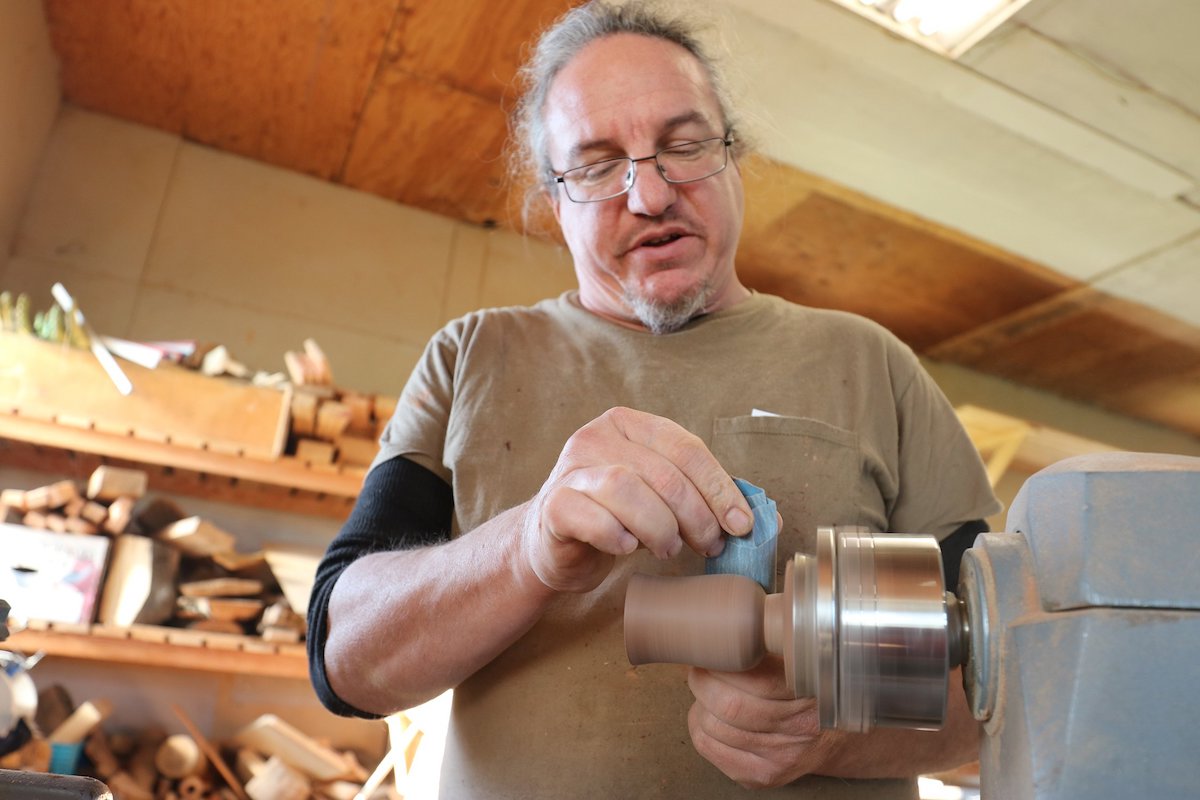By Ed Langlois, Catholic News Service
CARLTON, Ore. — It’s not the North Pole, and the workers aren’t elves, but the woodshop at Blanchet Farm in Carlton does produce joy and goodwill.
On a brisk December afternoon, Tony Aguire deftly turned a chunk of walnut wood into a smooth, elegant, thin-walled bell that will adorn the Christmas tree of a needy family. Not far away, Nathan Ladendorff and Andrew Conti carefully painted ornaments.
The three men appear deeply satisfied. That’s a welcome change after years of carrying burdens such as trauma, fear, booze and drugs. Like all Christians during Advent, the woodworkers wait patiently for something new to emerge in their lives.
Aguire had woodworking experience, having watched his father at the lathe. It’s not lost on him that converting a rough block of wood into something beautiful symbolizes what he’s trying to do with his life. Having dealt with post-traumatic stress disorder, he finds the craft harnesses his creative power and releases tension.
“This is a good environment to get better,” he said of the woodshop and the rest of the 40-acre farm an hour southwest of Portland. “It’s a place to get back on your feet.”
Conti calls the farm “a good place to get things together with a solid support system.”
Ladendorff, who grew up in Tillamook and has lived in Eastern Oregon, is no stranger to farm life. He feels at home here and knows it’s a path to what he called a “real fresh start” in an interview with the Catholic Sentinel, newspaper of the Archdiocese of Portland.
Blanchet Farm, an offshoot of Blanchet House of Hospitality in Portland, was founded in 1962 inspired by the Catholic Worker Movement. A group of University of Portland alumni had named their ministry after the first archbishop in Oregon, Francis Norbert Blanchet. Volunteers already had been serving meals in Portland’s Old Town for a decade but knew some homeless men needed a different place for healing.
“This Skid Road environment is like a miasma, a quicksand, a recontaminating cloud,” the founders wrote in the Catholic Sentinel 59 years ago. “Men who really want to escape from their disastrous past, who truly want to help themselves — and there are plenty of such — these men desperately need a refuge outside the city.”
Blanchet Farm usually has about 20 men in recovery who can stay for months, working the program and tending the land and the animals.
Ross Sears, manager of Blanchet Farm, knows what the woodworkers are going through. He arrived at the farm as a resident in 2008, having been in and out of treatment many times.
Caring for pigs, chickens and dogs was part of his path to sobriety. In the woodshop, he cleared his head and let his creativity flow. He made useful items, like chairs and benches. He crafted gifts for others. He’s still at it.
“You find an artistic side to yourself you didn’t know was there,” said Sears. “These guys in general don’t have a lot to feel good about when they get here but to be able to fix something or make something is huge.”
Debra Fresh, a case manager at Blanchet Farm, sees the woodshop and other creative outlets as vital to recovery and restoration. She connects the Blanchet woodworkers to people who could use their handiwork.
“Sometimes we get lost and forget we have a purpose in life,” Fresh said. “When they have something concrete to hold onto, it reminds them they are capable: ‘I made that table,’ ‘This is my garden.'”
Alumni of the farm often return and point proudly to benches or chairs they made and that are being used by current residents.
“To give back is an amazing feeling,” Fresh said. “The guys get to be a little creative. I have seen so many talented men.”
Some graduates of the farm receive a good gift for any time of year; they have turned their woodshop experience into jobs in cabinet shops and carpentry.






